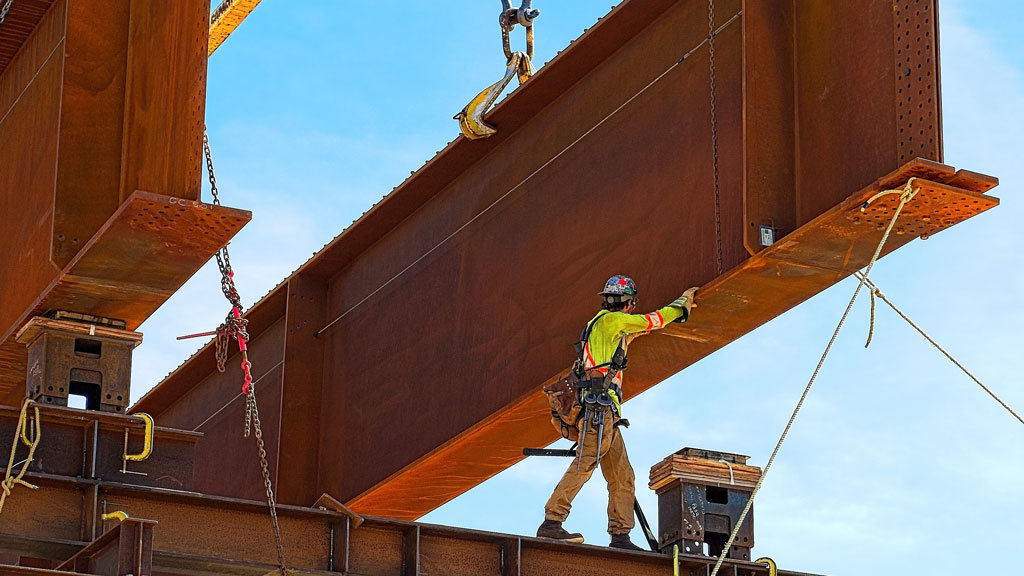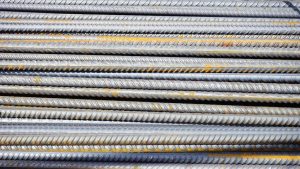The United Steelworkers (USW) union is calling on Prime Minister Justin Trudeau as well as the premiers of all Canadian provinces to implement policies that require Canadian-made steel to be used on all major public infrastructure projects.
With the Keystone XL pipeline all but dead, USW Western Canada director Stephen Hunt says it’s time for politicians to prioritize the use of Canadian-made steel instead of bringing in imported product from overseas.
“Politicians are really quick to say that we need to do infrastructure,” he says. “OK, that’s good, great. But if you’re going to do that, at least source your raw materials including steel, where possible, from Canada.
“That makes sense, as they’re using taxpayer dollars from the people that work in those industries to fund the projects.”
The disappointing cancellation of the Keystone XL pipeline project delivered another blow for workers at Canadian steel plants who are already struggling with layoffs and very few orders on the books. U.S. President Joe Biden scuttled the $8-billion project by revoking a key permit during his first day in office.
“Layoffs and plant closures seem to be the only orders on the books for many Canadian steel plants,” says Hunt, noting the decision comes at a time when major government infrastructure projects are using pipe and rebar made offshore instead of using steel manufactured at the struggling Canadian plants.
Procurement policies for major construction projects like the new Pattullo Bridge in Surrey, B.C., the Kitimat LNG project, replacement lines for SaskEnergy, and the northern Alberta TC Energy project do not prioritize the use of Canadian-made steel, according to the USW, which represents more than 11,000 workers.
“We must do more to protect our manufacturing industries in Canada as we can not afford more job losses and more good-paying Canadian jobs moved offshore,” says Hunt.
Steel is being brought into Canada from all over the world but mainly from India and China, as well as from Korea, Bulgaria and Romania, he says, because it’s cheaper.
By using steel made in Canada, the USW figures Canada can save 12 million tons of greenhouse gases annually.
According to the Canadian Steel Producers Association, steel made in this country has three times less greenhouse gas emissions from transportation than imported steel.
“I don’t get it,” says Hunt. “We have a carbon tax on steel here. We’re making steel here and we’re exporting it and we pay a carbon tax. When they import steel, they don’t pay a carbon tax. That drives people nuts, but why don’t we put on an equivalency tax, especially for products that we make here coming in? It seems to me that our manufacturers are in direct competition with others that have an unfair advantage.”
The LNG project in B.C., for example, is buying steel components made in China and the huge Pattullo Bridge project has purchased steel from Korea, says Hunt.
The USW is arguing its case before the Canadian International Trade Tribunal (CITT) on matters related to the LNG and Pattullo Bridge projects.
In the U.S., the steel workers have standing and therefore can raise a complaint and just need to show there is injury to workers, claims Hunt, but in Canada there are big differences as the union does not have standing.
“We don’t have that here. We’ve asked the federal government for that and we said, ‘Why is it that only the industry can raise an objection?’ Why can’t the unions representing the workers say, ‘Just a minute, we lost a contract to another country because we can’t compete so what are you going to do about that?’”
The union has sent letters to Trudeau and each of the premiers on the issue, but has had no response, Hunt states.
“We’re bucking all kinds of issues on this and we get it and we understand the dynamics of all of it but generally the response is, ‘Well you know, there’s no response, Sorry, too bad for you.’”
Late last year, Hunt travelled to Calgary for the closing of a plant that had been making steel for 60 years.
“It’s completely shuttered,” he says. “It went down, permanently.”
In Hamilton, Ont. meanwhile, Stelco – a plant that at one time had 18,000 workers – is now down to less than 800.
“That’s 18,000 direct members and then there are 4,000 to 5,000 workers to support that, right down to the hospitality industry. So, when you’ve got a community like Hamilton, it guts it. It’s an economic driver.”
The USW launched a national Stand Up for Steel campaign aimed at ensuring the long-term health of the industry.
“We’re standing up for our members and families and our community, that’s what we’re doing,” says Hunt. “We’re standing up for Canada.”











Recent Comments